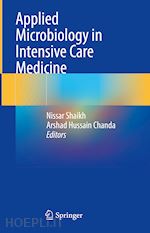
Questo prodotto usufruisce delle SPEDIZIONI GRATIS
selezionando l'opzione Corriere Veloce in fase di ordine.
Pagabile anche con Carta della cultura giovani e del merito, 18App Bonus Cultura e Carta del Docente
This book covers microbiological features of the diseases that require intensive care support, including iatrogenic and hospital-acquired infections. The knowledge will assist in the early diagnosis and treatment of bacterial, viral, and fungal infections requiring critical care admission to improve patient outcomes. All microbiological and therapeutic concerns and management of infectious disorders of all human body systems, from the brain to the musculoskeletal system, are addressed. It also describes practical and descriptive ways to prevent, diagnose, and manage various known and forthcoming healthcare-associated illnesses, ranging from MRSA to VRE and others.
Applied Microbiology in Intensive Care Medicine will benefit not only intensive and critical care practitioners but also infectious disease practitioners and physicians, surgeons, intensivists, clinical pharmacists, nurses, and technicians in intensive care units.
1 Necrotizing fasciitis: Pillars for improved patients’ outcome.- 2 Hospital acquired infections: Key for prevention and clinical bundles.- 3 Antimicrobial Stewardship in ICU: A success story.- 4 Perioperative Sepsis and Septic Shock: An update.- 5 Urosepsis and Septic Shock: A simple infection progressing to complex one.- 6 Community Acquired pneumonia- Recent Advances.- 7 Septic abdomen: An update on its microbiology and management.- 8 Descending Necrotizing Mediastinitis: A Life-threatening infection.- 9 Acute adult supraglottitis: An update.- 10 Meningitis and neurosurgical treatment: an update.- 11 MRSA to VRE: Management and prevention.- 12 Future of Applied Microbiology in Critical Care.- 13 Importance of Infectious Disease specialist and/or Clinical Microbiologist during multidisciplinary rounds in Intensive Care Unit.- 14 Obstetric Sepsis and Management.- 15 Infection and sepsis management in trauma.- 16 Intensivist's Role in Epidemic and Pandemic.
Dr. Nissar Shaikh (MD, EDIC, DID, FCCM) graduated from the Marathwada university of India. He is a senior consultant and SICU fellowship director at Hamad medical corporation Doha-Qatar, assistant professor at Weill Cornell Medical College in Doha-Qatar, and associate professor at College of Medicine Qatar University. Dr. Nissar made numerous oral and poster presentations at national and international conferences. He has around 150 peer-reviewed publications, written three medical critical care books, and 30 medical book chapters. He is a founding faculty and the first associate director of the surgical fellowship at Hamad Medical Corporation and Qatar. He won three prestigious stars of excellent awards for distinguished services.
Dr. Arshad Hussain Chanda is a Consultant in the Surgical Intensive Care Unit at Hamad Medical Corporation, Qatar. Dr. Arshad brings over 20 years of experience in intensive care medicine to his role as a consultant.
Dr. Arshad expertise lies in providing critical care to surgical patients. Drawing on his extensive background in critical care, Dr. Arshad strives to deliver the best possible care for surgical patients. In addition to his clinical practice, Dr. Arshad is actively involved in medical education and knowledge dissemination. He has authored several chapters on topics related to intensive care management, demonstrating his commitment to sharing his expertise with the broader medical community. Dr. Arshad has co-authorship of numerous articles published in prestigious peer-reviewed journals. These publications contribute significantly to the advancement of knowledge in the field of intensive care.











Il sito utilizza cookie ed altri strumenti di tracciamento che raccolgono informazioni dal dispositivo dell’utente. Oltre ai cookie tecnici ed analitici aggregati, strettamente necessari per il funzionamento di questo sito web, previo consenso dell’utente possono essere installati cookie di profilazione e marketing e cookie dei social media. Cliccando su “Accetto tutti i cookie” saranno attivate tutte le categorie di cookie. Per accettare solo deterninate categorie di cookie, cliccare invece su “Impostazioni cookie”. Chiudendo il banner o continuando a navigare saranno installati solo cookie tecnici. Per maggiori dettagli, consultare la Cookie Policy.